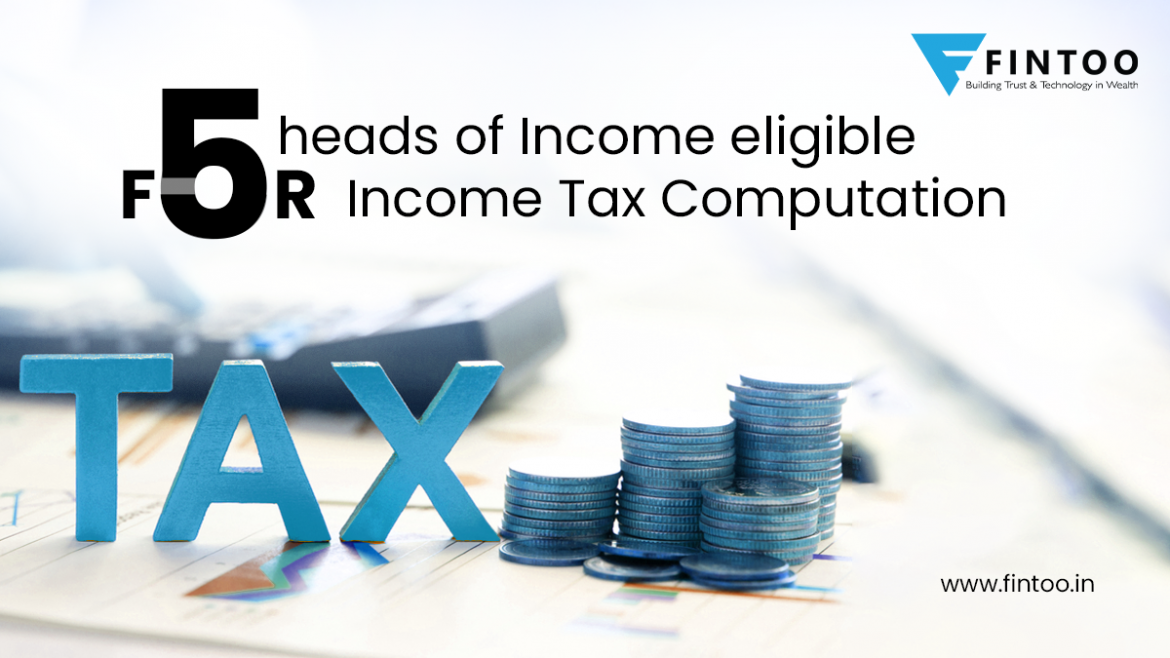

As per Section 14 of the Income Tax Act of 1961, there can be several modes of income for an individual. The income tax computation is an important part and has to be calculated according to the income of a person. For a hassle-free computation, the income has to be classified properly so that there is zero confusion regarding the same. The government has classified the sources of income under separate heads and then the income tax is computed accordingly. The provisions and rules are according to the details mentioned in the Income Tax Act.
The five main heads of income according to the above-mentioned Section 14 for the computation of the Income Tax in India are:
- Income from Salary
- Income from House Property
- Income from Profits and Gains of Business or Profession
- Income from Capital Gains
- Income from Other Sources
Let us understand these tax heads of income one by one in detail.
Income from Salary

This head essentially includes any remuneration, which is received by an individual in terms of services provided by him based on a contract of employment. This amount qualifies to be considered for income tax only if there is an employer-employee relationship between the payer and the payee respectively. Salary also include the basic wages, advance salary, pension, commission, gratuity, perquisites as well as an annual bonus.
The important point to note here is that salary is taxable on the due basis or received basis whichever is earlier. Let me explain this with the help of an example. If you received salary for the month of March 2020 in April 2020, it will still be taxable in the previous year 2019-20. This is because it was due in March. Similarly, if your employer has given you the salary of April and May in advance in the month of March, then it will be taxable again in the month of March itself.
Therefore, salary income will be taxable on the due basis or received basis whichever is earlier.
Further Reading: 10 Major Factors Affecting Financial Planning 2025
Income from House Property

According to the Income Tax Act 1961, Sections 22 to 27 is dedicated to the provisions for the income tax computation of the total standard income of a person from the house property or land that he or she owns.
In simple terms, this head includes rental income received from the properties. For tax computation purposes, the property in which you are staying and not earning any rental income can give you benefits. This benefit is in the form of deductions of interest paid on home loan.
However, if the property is utilized for letting out the normal course of business, then the income from the rent will be considered.
Income from Profits and Gains from Business or Profession

The income tax computation of the total income will be attributed from the income earned from the profits of business or profession. The difference between the expenses and revenue earned will be chargeable. Here is a list of the income chargeable under the head:
- Profits earned by the assessee during the assessment year
- Profits on income by an organisation
- Profits on sale of a certain license
- Cash received by an individual on export under a government scheme
- Profit, salary or bonus received as a result of a partnership in a firm
- Benefits received in a business
Income from Capital Gains

Capital Gains are the profits or gains earned by an assessee by selling or transferring a capital asset, which was held as an investment.
Capital asset can be real estate, stocks, Mutual funds, Bonds, Gold etc.
So whenever you sell a capital asset and earn gains. This is considered as your income which will be taxable under the head Capital Gain.
Just to clarify, please note that rental income from the property is taxed under “Income from House Property” but if you sell the property and experience gain, it will be taxed under “capital gain”.
Income from Other Sources

This is the last head of income. Any other form of income, which is not categorized in the above mentioned 4 tax heads, can be sorted in this category.
Some of the examples can be interest income from bank deposits, lottery awards, card games, gambling or other sports awards are included in this category.
These incomes are attributed in Section 56(2) of the Income Tax Act and are chargeable for income tax.
Now that you are aware of the five heads of income, take out a piece of paper, write down all the sources of income that you have and classify it into these 5 tax heads. This will help you to plan your taxes well. This is the first step to identify your incomes in respective heads.
If you need expert help in doing so, get in touch with our financial tax experts at Fintoo who will guide you in the best possible way to plan your taxes.
To Invest and keep regular track of your portfolio download Fintoo App Android http://bit.ly/2TPeIgX / Fintoo App iOS – http://apple.co/2Nt75LP
Related Posts
Stay up-to-date with the latest information.


